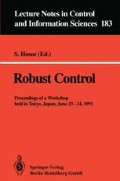Abstract
A tracking problem for linear uncertain systems is considered. A robust feedback controller is designed such that the closed loop system is quadratically stable and its output tracks a command step input. One such controller is obtained by applying the quadratic stabilization method from the viewpoint of Inverse LQ problem. Attractive features of the design method proposed lie in its simplicity in several senses from the practical viewpoint.
Preview
Unable to display preview. Download preview PDF.
Reference
E.J. Davison (1976), “The robust control of a servomechanism problem for linear time-invariant multivariable systems,” IEEE Trans. Auto. Control, vol. AC-21.
W. E. Schmitendorf and B. R. Barmish (1986), “Robust Asymptotic Tracking for Linear Systems with Unknown Parameters,” Automatica, vol.22, 355–360.
B. R. Barmish (1985), “Necessary and sufficient conditions for quadratic stabilizability of an uncertain linear system,” J. Optim Theory. Appl., vol. 46, 399–408.
I. R. Petersen (1987), “A stabilization algorithm for a class of uncertain linear systems,” Systems & Control Lett., 8, 351–357.
I. R. Petersen (1988), “Stabilization of an uncertain linear system in which uncertain linear parameters enter into the input matrix,” SIAM J. Control Optim., vol. 26, 1257–1264.
P. P. Khargonekar, I. R. Petersen, and K. Zhou (1990), “Robust stabilization of uncertain linear systems: quadratic stabilizability and H ∞ control theory,” IEEE Trans. Auto. Control, vol. 35, 356–361.
T. Fujii (1987), “A new approach to LQ design from the viewpoint of the inverse regulator problem,” IEEE Trans. Auto. Control, vol. AC-32. 995–1004.
T. Fujii, et al. (1987), “A Practical Approach to LQ design and its application to engine control,” Proc. 10th IFAC World Congress, Munich.
T. Fujii, T. Tsujino, and H. Uematsu, “The design of robust servo systems based on the quadratic stability theory,” Trans. of ISCIE, to be published (in Japanese).
T. Fujii and T. Tsujino (1991), “An Inverse LQ Based Approach to the Design of Robust Tracking Controllers for linear uncertain systems,” Proc. of MTNS, Kobe.
K. Zhou and P.P. Khargonekar (1988), “An algebraic Riccati equation approach to H ∞ optimization,” Systems & Control Lett., 11, 85–91.
Author information
Authors and Affiliations
Editor information
Rights and permissions
Copyright information
© 1992 Springer-Verlag
About this paper
Cite this paper
Fujii, T., Tsujino, T. (1992). An inverse LQ based approach to the design of robust tracking system with quadratic stability. In: Davisson, L.D., et al. Robust Control. Lecture Notes in Control and Information Sciences, vol 183. Springer, Berlin, Heidelberg. https://doi.org/10.1007/BFb0114655
Download citation
DOI: https://doi.org/10.1007/BFb0114655
Published:
Publisher Name: Springer, Berlin, Heidelberg
Print ISBN: 978-3-540-55961-0
Online ISBN: 978-3-540-47320-6
eBook Packages: Springer Book Archive

